Originally Published on: UNU – CRIS
Amid global attention on conflicts in Gaza and Ukraine, a largely ignored proxy war continues in the Republic of Sudan, often veiled in misinformation and disregarded as geopolitically unimportant by the Western world. This war, similar to those in Ethiopia’s regions of Tigray, Oromia, Amhara, and the Democratic Republic of the Congo (DRC), has quietly claimed millions of lives and decimated the livelihoods of hundreds of millions. Moreover, it has led to the fragmentation of states, posing significant threats to international peace and security.
In their recent New York Times piece titled “The War the World Forgot,” renowned experts Alex de Waal and Abdul Mohammed, known for their academic and mediation work in Sudan, unveil the untold narratives and ongoing atrocities of one of Africa’s forgotten wars (de Waal and Mohammed 2023). Their article highlights the long-standing causes, the complex dynamics involving proxy actors, and the extensive consequences for civilians and the wider region. They criticize the international community’s silence and its failure to support peace initiatives led by Kenya and Egypt, which aim to end the grievous conflict in Sudan. Additionally, they point out the particular failure of the USA in curbing its Middle Eastern partners’ interference in this proxy war.
This paper examines the increasing displacement and intensifying humanitarian crisis in the Republic of Sudan, resulting from the war between rival factions of the armed forces, namely the Sudanese Armed Forces (SAF) and the Rapid Support Forces (RSF). It highlights how poorly governed political transitions and centre–periphery rivalries contribute to ongoing war, death, destruction, and displacement. The data shows rapid changes in patterns of human displacement within Sudan and beyond its borders, with Khartoum and the Darfur region now being the primary origins and hosts of displacement respectively. Currently, half of Sudan’s population requires aid, owing to the dire humanitarian consequences of the war.
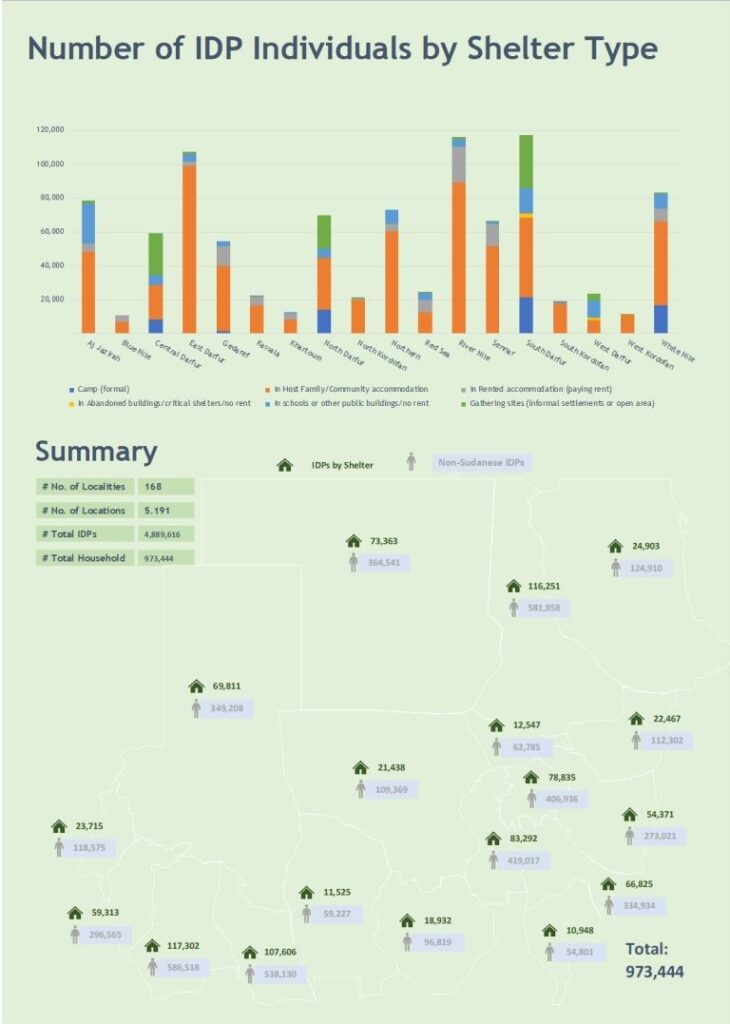
Figure 1: Author, IDPs in Sudan by Shelter (Data from IOM, 2023).
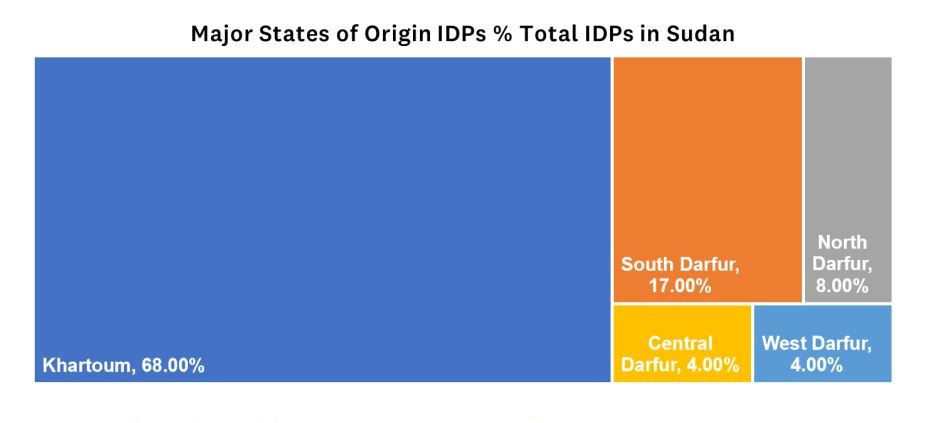
Figure 2: Author, Major States of Origin of IDPs of Total IDPs in Sudan (Data from IOM, 2023).
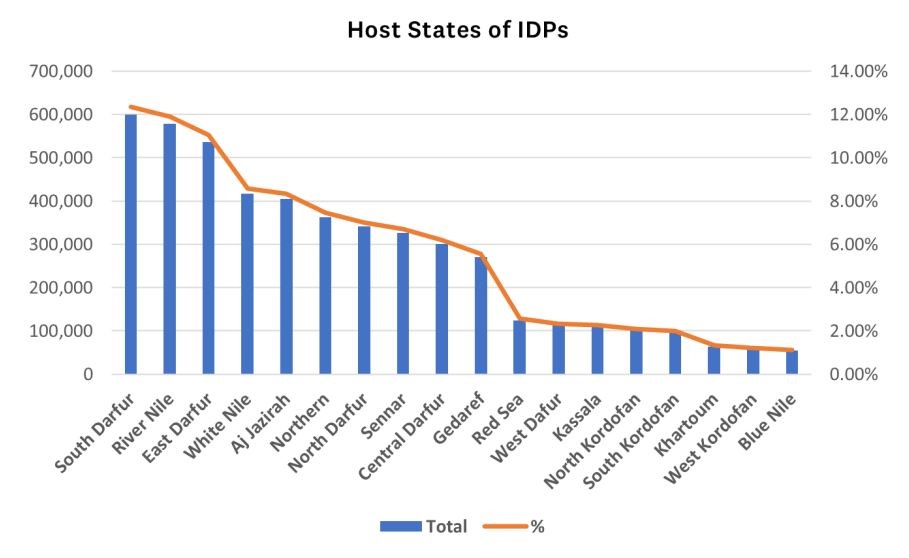
Figure 3: Author, Host state by % total IDPs, (Data from IOM, 2023).
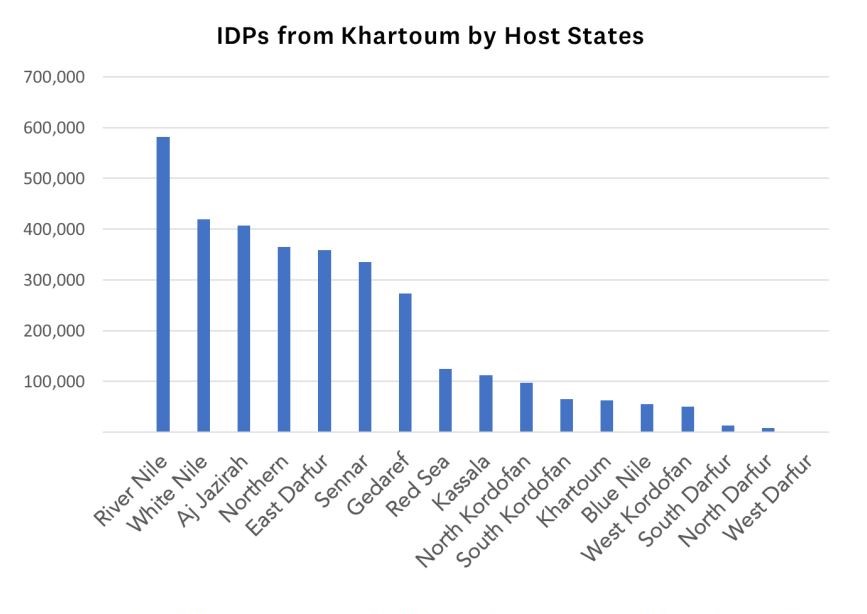
Figure 4: Author, Host States of IDPs from Khartoum (Data from IOM, 2023).
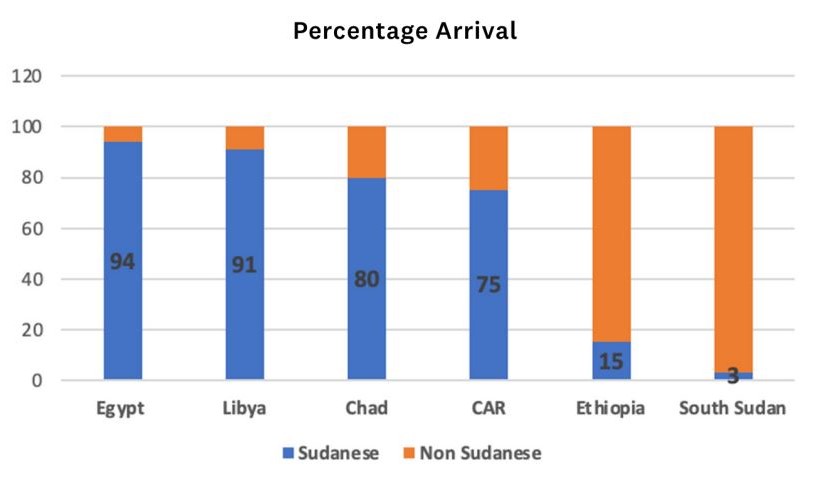
Figure 5: Author, Percentage arrival, (Data from IOM, 2023).
The paper advances a dual approach – addressing urgent humanitarian needs and cessation of hostilities while pursuing long-term solutions through inclusive political transition and governance reforms to resolve protracted displacement. It argues that addressing the complex dynamics of Sudan’s enduring conflicts and achieving sustainable peace require more than just immediate actions such as a ceasefire and unhindered humanitarian access. What is also needed is a comprehensive approach to tackling the political roots of these conflicts. While acknowledging the priority of a ceasefire and humanitarian access, the paper delves into the political dimensions of the conflict, and the necessity of a civilian-led transition process that is both inclusive and comprehensive, encompassing various Sudanese stakeholders. It emphasises the need for inclusive, civilian-led negotiations that go beyond the military leadership and critically examines the evolving roles of armed groups, Islamists, and former National Congress Party members, highlighting the importance of adapting negotiation strategies to new realities on the ground.
A successful resolution to the conflict requires a comprehensive political transformation and a commitment to addressing underlying issues. In addition, the paper addresses the effect of external interventions on Sudan’s internal affairs particularly from the states in the Middle East and neighbourhood. It advances a transition strategy that tames external interferences, while at the same time promoting decentralized governance. This approach help dismantle the centralised power structures that have relied in the support of external actors and historically fuelled protracted war, thereby paving the way for a more decentralised, stable and accountable transitional process. Enabling a transition inclusive of all civilian stakeholders in the transition process is crucial for insulating a Sudanese peace process that could deliver a sustainable ceasefire, effectively resolving the Sudan’s prolonged conflicts, halting the atrocities in Darfur and elsewhere, and addressing mass displacement within and outside Sudan.
Amid global attention on conflicts in Gaza and Ukraine, a largely ignored proxy war continues in the Republic of Sudan, often veiled in misinformation and disregarded as geopolitically unimportant by the Western world. This war, similar to those in Ethiopia’s regions of Tigray, Oromia, Amhara, and the Democratic Republic of the Congo (DRC), has quietly claimed millions of lives and decimated the livelihoods of hundreds of millions. Moreover, it has led to the fragmentation of states, posing significant threats to international peace and security.
Resolving the present problems in Sudan requires an immediate ceasefire, unobstructed humanitarian access, and the provision of aid and protection for those in need; however, in the longer term, any solution hinges on addressing the political roots of the crisis. As in many African countries, decades of humanitarian crises and displacement arising from war and disaster have been a harsh and enduring reality for Sudan. To break this cycle and resolve the current turmoil the country must set itself on a path toward a broad-based, civilian-led political transition that is representative of all Sudanese.
Currently, there are at least three parallel and separate official mediation initiatives that are yet to be coordinated:
- The Jedda process, run by Saudi Arabia and the US – two countries that have high state leverage to bring warring parties together.
- The Cairo process, which incorporates bordering countries hosting refugees, with support of the League of Arab States (of which Sudan is a member); and
- The Addis Ababa process under the auspices of IGAD, which enjoys the symbolic support of the AU.
While each of these mediation processes is unique in its approach to and leverage with the warring parties and Sudanese stakeholders, each also reflects the diverse national interests and underlying concerns of the sponsoring states and the international community, particularly regarding the role of Islamist movements and the dynamics of the war. These interests might not always resonate with the genuine concerns and aspirations of the Sudanese populace. Additionally, the existence of multiple mediation avenues may prompt Sudanese stakeholders and warring factions to engage in mediation forum shopping, choosing the platform most aligned with their specific goals or agendas and so delaying a resolution to the conflict and a ceasefire agreement.
During the December 9, 2023, IGAD Extraordinary Summit, clarified the approach of IGAD and AU in leading the mediation process (IGAD 2023). The Jeddah Talks resulted in the signing of the Humanitarian Access Agreement, aimed at ensuring unimpeded humanitarian access and civilian protection. However, there have been challenges in its implementation, as the parties violated the agreement and the co-facilitators have faced difficulties in ensuring its enforcement. IGAD’s acknowledgment of “modest progress” made in the Jeddah Talks raises questions about which achievements they are referring to. Unexpectedly, it also recognized the UAE for its support to the IGAD Summit. However, this communiqué was immediately met with rejection by the Sudanese Armed Forces (SAF).
Of more import, the IGAD Summit endorsed IGAD’s role as a co-facilitator, representing the African Union (AU), in the Jeddah Talks with KSA and the USA. The IGAD Executive Secretary has also been tasked with appointing a Special Envoy to Sudan and “to convey [the] communique to the African Union Peace and Security Council and the United Nations Security Council and seek their endorsement and support of the same”. This could help in the coordination and possible merger of the mediation process currently running in parallel.
Such a comprehensive strategy is the only way to alleviate the suffering of IDPs and refugees and ensure an enduring solution to Sudan’s protracted conflict. The Sudanese humanitarian crisis and displacement will end only when the political issues are resolved.